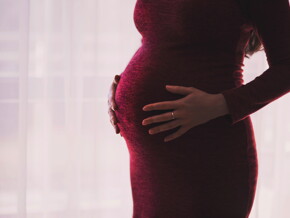
39 Weeks Pregnant: Your Body’s Getting Ready for Childbirth!
You can relax when you reach 39 weeks of pregnancy because your baby is officially full-term and ready to enter the world!
When you're 39 weeks pregnant, you have one more week to go before you finish this chapter of your pregnancy. Your baby's vital organs are now fully developed, which means there's less chance of pregnancy complications than in the earlier weeks.
You can relax a bit now, although how can you, right? After all, you're about to meet your little one. You're more likely interested to know what's coming up in the final stretch of your pregnancy, so let's jump right into it.
Fetal Development at 39 Weeks
With a week or so to go, your baby is full-term and just might be as excited as you to say “hello” to the world outside of your tummy. Still, a lot of developments are happening to your baby around this time.
- A thin layer of fat continues to develop under your baby's skin, which helps to control body temperature after birth.
- Your baby probably weighs between 2.5 and 4 kg.
- Their bones have started hardening except for the cranial bones around their brain.
- Your baby has lost its soft, fine hair cover (also known as lanugo) but now has hair on the head.
- Your baby's brain continues to grow at 39 weeks and weighs 1/3 more than it did at 35 weeks.
- Your baby has now dropped down into your pelvis to prepare you for birth.
Your Pregnancy Symptoms at Week 39
You probably feel a mix of impatience, heaviness, and anxiety now that you’re almost ready to pop. You might also start noticing new symptoms that didn't appear during your first and second trimesters. Here's what to expect at Week 39 of pregnancy.
Trouble sleeping
Increased urination frequency, hormonal changes, pressure on the diaphragm, and cramps can contribute to disrupted sleep.
Lower back pain
During pregnancy, hormones loosen up the connective tissue that keeps your bones in place, especially around your pelvic area. These may lead to lower back pain and pressure from your growing belly, which can stretch out your stomach muscles.
Hemorrhoids
Hemorrhoids or piles can develop due to pressure from your growing uterus, increased blood flow in the pelvic area, and constipation brought on by hormonal changes. You might also notice spider or varicose veins appearing from that extra blood circulation. You can check with your ob-gyn on what you can do about it.
White milky discharge
Also known as leukorrhea, white, odorless milky discharge at Week 39 can occur because of higher estrogen levels and the extra mucus the cervix produces to help protect the baby. Not everyone experiences it; if you do, it's totally normal.
Diarrhea
Diarrhea at 39 weeks pregnant often happens because of higher prostaglandin levels, which can kick up contractions but also speed things up in your digestive system.
Signs of Labor at 39 Weeks Pregnant
Even though you may not be due for a week, closely monitor your pregnancy symptoms, as they could indicate you're about to go into labor. Some moms experience early labor symptoms days before the big moment, while others find things progress quickly and unexpectedly.
The key is being in tune with your body, so you are prepared when you spot these signs of labor.
Contractions
Contractions feel like intense menstrual cramps. They come at regular intervals and get shorter and shorter. It's time to head for the hospital when your contractions become less than 10 minutes apart!
You may also experience "false labor," or Braxton-Hicks contractions. These occur irregularly, and it feels like your belly is tightening up and then relaxing again. Switching up your position can sometimes trigger these contractions, but they usually go away at rest.
Brownish discharge
If you notice a brownish discharge at 39 weeks of pregnancy, it's a sign that your cervix has begun to open. You may also see the mucus plug that seals your cervix during pregnancy.
The mucus plug is a sticky, jelly-like substance that may come out as a blob. It may appear pinkish due to a small amount of blood mixed in. Remember, even if this happens, you could still be days away from going into labor, so check with your doctor.
Is It Safe to Deliver When 39 Weeks Pregnant?
While a full-term pregnancy wraps up around the 40th week, there’s no need to stress if your little one decides to come out during the 39th week. Healthcare providers consider a birth between 39 and 40 weeks and 6 days as “full term.”
What and How Much to Eat When You’re 39 Weeks Pregnant

In addition to a healthy diet, your ob-gyn may recommend prenatal vitamins such as iron, folic acid, and vitamin D.
Unless your doctor or nutritionist has specific instructions for your diet, continue eating a balanced diet focused on nutrient-rich, whole foods. You can use this nutrition guide created by the Food and Nutrition Research Institute’s (FNRI), which shows what (and how much) pregnant women ideally eat every day.
FNRI’s daily eating plan should include:
- 6-8 glasses of water/beverages
- 5 1/2-6 servings of rice, bread, root crops, or noodles
- 2 servings of fruit
- 3-4 servings of vegetables
- 1 glass of milk
- 1 egg
- 4–5 servings of fish, meat, and poultry
- 7 teaspoons max of fats and oils
- 6 teaspoons max of sugar or sweets
No need to follow it perfectly every single day. But you want to "eat all the colors of the rainbow"—add a mix of colorful fruits and veggies to your daily meals. Listen to your hunger cues, and don’t deprive yourself.
Check out these meal plan ideas for pregnant women to better understand what foods should be on your plate, especially in your last trimester.
Preparing Emotionally for Childbirth
Once you hit the third trimester, it’s normal to feel like your emotions are all over the place. Worries can sneak in, like, "Will labor hurt?” “Do I have everything ready?” “Will I be a good parent?” And while those thoughts are valid, carrying them alone can feel burdensome.
Here are a few practical ways to support your emotional well-being before delivery day:
Build a reliable support circle

Find a partner to practice breathing exercises with and be there when you're in labor.
Think about who makes you feel calm, heard, and cared for: your partner, a trusted friend, or a sibling. Let them know what kind of support you need, whether joining you for labor, checking in regularly, or being your go-to person when you need to vent or cry.
Bring your questions to your doctor
Don't hesitate to ask questions during your prenatal visits, no matter how small they seem. Ask about pain relief options or what to expect during labor. Putting together a birth plan can also help you feel more in control. If emotions feel heavy or anxiety kicks in, speak up. Your doctor can guide you to the proper support.
Now’s also the perfect time to double check your hospital bag, just in case those first signs of labor appear.
Write your thoughts down
Jotting down a few thoughts at the end of the day can help clear your mind. Make two lists: what excites you and makes you anxious about birth and parenting. Seeing your thoughts on paper can help you spot patterns, find solutions, and know when to ask for help. It’s also a lovely way to reflect on how far you’ve come.
Your baby is just about ready to handle the new world outside! Take a deep breath and allow yourself to slow down as you step into your 39th week of pregnancy. Your body knows what it’s doing, and you and your baby are doing beautifully. You’ve got this, Mom!
Learn what happens in the next stage of your journey at 40 weeks and share your thoughts on ParenTeam's Facebook group!
References
“Definition of Term Pregnancy,” ACOG, n.d., https://www.acog.org/clinical/clinical-guidance/committee-opinion/articles/2013/11/definition-of-term-pregnancy.
“Fetal Development.” Cleveland Clinic, March 19, 2025. https://my.clevelandclinic.org/health/articles/7247-fetal-development-stages-of-growth.
Nhs Website, “Signs That Labour Has Begun,” nhs.uk, December 9, 2024, https://www.nhs.uk/pregnancy/labour-and-birth/signs-of-labour/signs-that-labour-has-begun/.




























